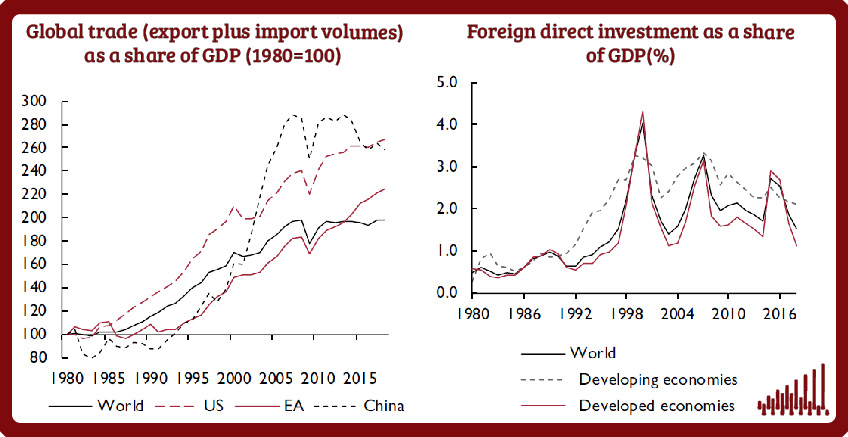- Home
- Publications
- The Macroeconomics Of De-Globalisation
The Macroeconomics of De-Globalisation
 Pub. Date
Pub. Date
 Pub. Type
Pub. Type

Downloads
The macroeconomics of de-globalisationRelated Themes
Macro-Economic Dynamics and PolicyThis is a preview from the National Institute Economic Review, August 2020, no 253.
The Covid-19 pandemic has revived protectionist measures. The most proximate trigger for this switch is a desire to prioritise national security interests and public health concerns over the long- standing economic rationale for free trade, which is to maximise productivity (Ricardo, 1817) and tap new markets. The macroeconomic consequences of protectionism will depend on the specific form that it takes but, if history serves as a guide, a more restrictive global trading environment is likely to reduce cross-border capital flows, bear down on productivity and economic growth, raise the neutral global interest rate, R*, and exert upward pressure on wage and price inflation. Low-and middle-income countries that have benefitted from globalisation are particularly vulnerable in this environment, as are workers that are exposed to global trade in developed economies.
The analysis in this Box has been prepared by Iana Liadze and Amit Kara.
Related Blog Posts



Public Debt Sustainability and Fiscal Rules
Stephen Millard
Benjamin Caswell
05 Feb 2024
4 min read

Related Projects
Related News

Call for Papers: Lessons From Quantitative Easing & Quantitative Tightening
09 Feb 2024
1 min read



Related Publications

The Financial (In)Stability Real Interest Rate, R**, as a Monetary Policy Constraint
07 Feb 2024
Global Economic Outlook Box Analysis

Geopolitical Risks and the Global Economy
07 Feb 2024
Global Economic Outlook Box Analysis

The Spectre of a US House Price Correction
07 Feb 2024
Global Economic Outlook Box Analysis

Inflation Differentials Among European Monetary Union Countries: An Empirical Evaluation With Structural Breaks
20 Nov 2023
National Institute Economic Review
Related events

Assessing Cycles and Structural Changes in Markets

Business Conditions Forum

2022 Dow Lecture: The Economy and Policy Trade-Off






